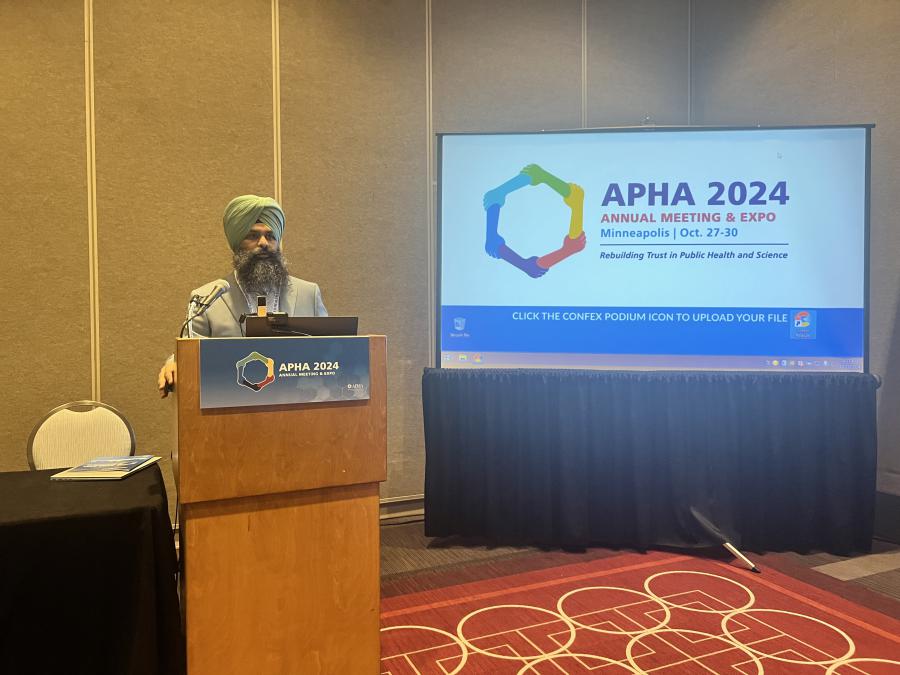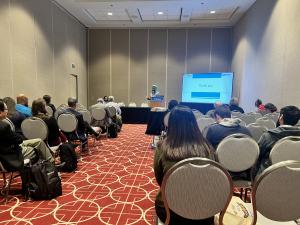
Protecting Public Health Integrity in the Age of AI: Leadership Strategies from Satpreet Singh at APHA 2024
Leading the Future of Public Health: Satpreet Singh's Framework for Ethical AI Implementation Unveiled at APHA 2024
MINNEAPOLIS, MN, UNITED STATES, November 6, 2024 /EINPresswire.com/ -- At a time when artificial intelligence (AI) is driving profound shifts across public health sectors, ensuring that these tools are used ethically and equitably is paramount. Addressing this need, Satpreet Singh presented his research, "Leadership Strategies for Ensuring Trustworthy Development and Implementation of AI in Public Health: Mitigating Algorithmic Bias, Protecting Privacy, and Preventing Social Manipulation," at the American Public Health Association (APHA) 2024 Annual Meeting in Minneapolis. This meeting, a prominent gathering of public health professionals, highlighted the critical need to rebuild trust in public health and science—a mission that aligns closely with Satpreet Singh's research on fostering transparent, fair, and ethical AI solutions.
Singh, a distinguished expert in leadership and sustainable development, explored pressing issues of algorithmic bias, data privacy, and social manipulation risks posed by AI systems in public health. His presentation offered a roadmap for public health leaders to implement AI with a rigorous ethical foundation that benefits communities while protecting individual rights.
Addressing Algorithmic Bias
One of the most pressing concerns in AI-driven public health tools is algorithmic bias—when AI models inadvertently reflect prejudices in data, leading to discriminatory outcomes. In Dr. Singh’s analysis, algorithmic bias can compound health disparities, as AI tools in diagnostics, disease prevention, and resource allocation may disadvantage vulnerable populations.
Satpreet Singh emphasized that leaders must adopt proactive strategies, including:
• Diverse Data Inclusion: By integrating data from diverse demographics, AI systems can achieve more balanced and fair outcomes. Dr. Singh noted that this requires cross-sector partnerships to build inclusive datasets.
• Bias Detection and Auditing: Regular audits and bias testing are essential to identify and mitigate disparities. Dr. Singh recommended leaders institutionalize bias monitoring within their AI governance frameworks, thereby ensuring that public health AI applications are continuously refined to uphold equity.
Ensuring Data Privacy
With AI tools often requiring access to sensitive health data, protecting data privacy is a foundational challenge. The risks of unauthorized data sharing or breaches have significant implications for public trust and individual well-being.
Singh outlined key leadership strategies for ensuring privacy protections:
• Data Minimization and Encryption: He advocated for limiting data collection to only what is necessary and securing it with robust encryption practices. This approach reduces risks by minimizing the data volume accessible to AI tools.
• Consent Management: Transparent data collection and clear consent processes build trust between public health entities and communities. Leaders must ensure that AI systems are compliant with data privacy laws and ethical standards, thus fostering a culture of accountability and transparency.
In his presentation, Singh also addressed emerging privacy-preserving technologies such as differential privacy and federated learning. By adopting these technologies, public health agencies can leverage insights without compromising individual privacy, thus balancing innovation with security.
Preventing Social Manipulation
AI tools in public health possess the power to influence behaviors through predictive insights and personalized health recommendations. While beneficial, this influence also carries the risk of social manipulation if misused. Dr. Singh discussed the potential for AI systems to inadvertently encourage dependence or shape public opinion in unintended ways, especially when algorithms are not transparent.
To counter this, Singh recommended:
• Transparent AI Systems: He emphasized that public health leaders should demand transparency in AI tools, ensuring that the logic behind AI-driven recommendations is accessible and understandable to both professionals and the public.
• Public Education and Empowerment: A well-informed public is the best defense against manipulation. Singh urged public health leaders to prioritize educational campaigns that equip communities with the knowledge to critically engage with AI-driven health recommendations.
Singh’s approach calls for leadership to navigate the fine line between leveraging AI’s transformative potential and safeguarding the social well-being of those impacted by these technologies. This, he argued, requires a multi-stakeholder approach involving technologists, public health officials, community representatives, and ethicists.
The Leadership Role in Ethical AI Development
Throughout his presentation, Dr. Singh highlighted the essential role of leadership in fostering a culture of responsible AI development in public health. Effective leaders, he contended, must:
• Establish Ethical Standards: Leaders should create and enforce rigorous ethical guidelines for AI development, ensuring every stakeholder adheres to principles of fairness, transparency, and accountability.
• Promote Interdisciplinary Collaboration: Dr. Singh called on leaders to foster collaborations across disciplines to embed ethical considerations at every stage of AI design, deployment, and monitoring.
• Champion Public Accountability: Leaders must remain publicly accountable for the outcomes of AI tools, providing regular updates and maintaining open channels of communication with communities about the benefits, risks, and limitations of AI in public health.
Moving Forward: A Vision for Trustworthy AI in Public Health
Singh concluded his presentation by outlining a vision for the future where AI technology serves as a trustworthy partner in public health. He underscored that trustworthy AI requires both technological rigor and a leadership commitment to ethical stewardship, transparency, and continuous learning.
“Leadership in AI for public health is about more than adopting technology; it’s about embracing the responsibility to safeguard the values and rights of the people we serve,” said Dr. Singh. “With thoughtful leadership, we can harness AI to promote health equity, empower communities, and advance public health without compromising trust or integrity.”
Singh’s presentation at APHA 2024 not only addressed critical challenges but also offered a practical, ethical framework for leaders dedicated to the trustworthy integration of AI in public health. As the healthcare industry increasingly incorporates AI, Singh’s insights will be instrumental in guiding leaders toward solutions that prioritize human rights, dignity, and societal benefit.
About Satpreet Singh
Satpreet Singh is an expert in leadership development, sustainable practices, and public health strategy, widely recognized for his contributions to fostering ethical, transparent, and impactful leadership in technology. Through his work, Singh has advanced thought leadership in ethical AI practices, organizational development, and sustainable public health initiatives. His recent accolades include the Impact Excellence Award for Leadership Development in Sustainability, presented in Dubai in 2024.
As a sought-after speaker and researcher, Singh continues to advocate for leadership practices that align technological innovation with human values and social responsibility. His commitment to ethical standards and inclusivity in AI development has solidified his position as a thought leader in the fields of public health and sustainable leadership.
About APHA Annual Meeting
The American Public Health Association (APHA) Annual Meeting is one of the most significant gatherings for public health professionals, featuring experts, researchers, and leaders from across the globe. APHA 2024, held in Minneapolis, centered on the theme “Rebuilding Trust in Public Health and Science,” providing a platform for critical discussions on current and future public health challenges. The annual meeting underscores APHA’s mission to champion the health of all communities and promote science-backed solutions to public health issues.
Rupinder Kaur
Khalsa News and Podcasts
email us here
Distribution channels: Book Publishing Industry, Business & Economy, Conferences & Trade Fairs, Education, Media, Advertising & PR
Legal Disclaimer:
EIN Presswire provides this news content "as is" without warranty of any kind. We do not accept any responsibility or liability for the accuracy, content, images, videos, licenses, completeness, legality, or reliability of the information contained in this article. If you have any complaints or copyright issues related to this article, kindly contact the author above.
Submit your press release



